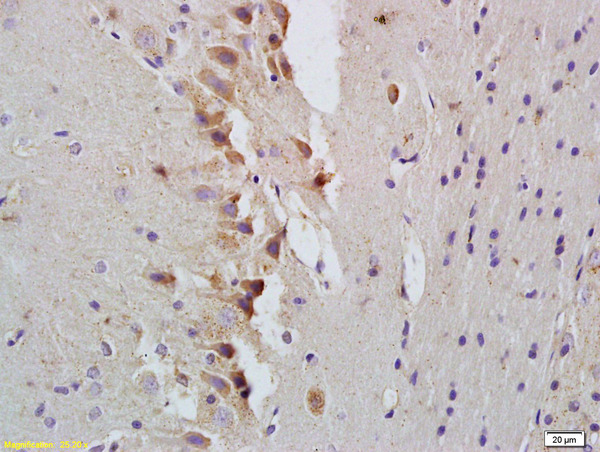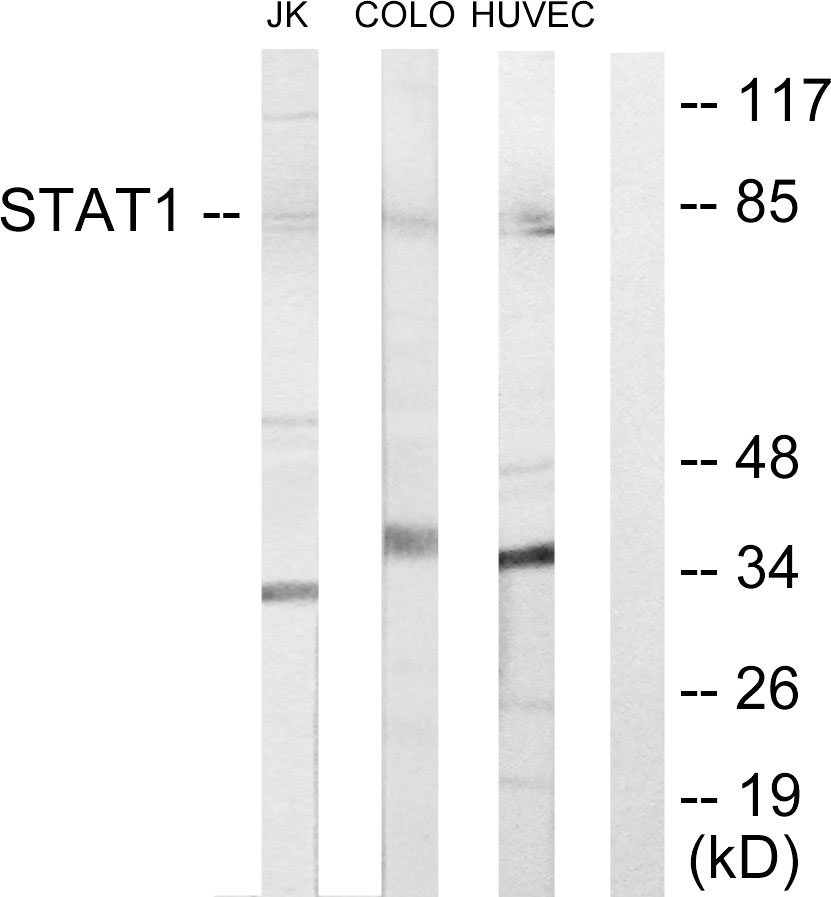![IHC-P analysis of human thyroid carcinoma tissue using GTX83552 STAT1 antibody [4H9]. Antigen retrieval : Heat-induced epitope retrieval by 10mM citrate buffer, pH6.0, 100oC for 10min. IHC-P analysis of human thyroid carcinoma tissue using GTX83552 STAT1 antibody [4H9]. Antigen retrieval : Heat-induced epitope retrieval by 10mM citrate buffer, pH6.0, 100oC for 10min.](https://www.genetex.com/upload/website/prouct_img/normal/GTX83552/GTX83552_1578_IHC-P_w_23061420_908.webp)
IHC-P analysis of human thyroid carcinoma tissue using GTX83552 STAT1 antibody [4H9]. Antigen retrieval : Heat-induced epitope retrieval by 10mM citrate buffer, pH6.0, 100oC for 10min.
STAT1 antibody [4H9]
GTX83552
ApplicationsImmunoFluorescence, Western Blot, ImmunoCytoChemistry, ImmunoHistoChemistry, ImmunoHistoChemistry Paraffin
Product group Antibodies
ReactivityCanine, Human, Monkey
TargetSTAT1
Overview
- SupplierGeneTex
- Product NameSTAT1 antibody [4H9]
- Delivery Days Customer9
- Application Supplier NoteWB: 1:1000-1:2000. ICC/IF: 1:50-1:100. IHC-P: 1:50. *Optimal dilutions/concentrations should be determined by the researcher.Not tested in other applications.
- ApplicationsImmunoFluorescence, Western Blot, ImmunoCytoChemistry, ImmunoHistoChemistry, ImmunoHistoChemistry Paraffin
- CertificationResearch Use Only
- ClonalityMonoclonal
- Clone ID4H9
- Concentration0.7 mg/ml
- ConjugateUnconjugated
- Gene ID6772
- Target nameSTAT1
- Target descriptionsignal transducer and activator of transcription 1
- Target synonymsCANDF7, IMD31A, IMD31B, IMD31C, ISGF-3, STAT91, signal transducer and activator of transcription 1-alpha/beta, signal transducer and activator of transcription 1, 91kD, signal transducer and activator of transcription 1, 91kDa, transcription factor ISGF-3 components p91/p84
- HostMouse
- IsotypeIgG1
- Protein IDP42224
- Protein NameSignal transducer and activator of transcription 1-alpha/beta
- Scientific DescriptionSignal transducer and activator of transcription that mediates signaling by interferons (IFNs). Following type I IFN (IFN-alpha and IFN-beta) binding to cell surface receptors, Jak kinases (TYK2 and JAK1) are activated, leading to tyrosine phosphorylation of STAT1 and STAT2. The phosphorylated STATs dimerize, associate with ISGF3G/IRF-9 to form a complex termed ISGF3 transcription factor, that enters the nucleus. ISGF3 binds to the IFN stimulated response element (ISRE) to activate the transcription of interferon stimulated genes, which drive the cell in an antiviral state. In response to type II IFN (IFN-gamma), STAT1 is tyrosine- and serine-phosphorylated. It then forms a homodimer termed IFN-gamma-activated factor (GAF), migrates into the nucleus and binds to the IFN gamma activated sequence (GAS) to drive the expression of the target genes, inducing a cellular antiviral state.
- ReactivityCanine, Human, Monkey
- Storage Instruction-20°C or -80°C,2°C to 8°C
- UNSPSC12352203

![IHC-P analysis of human breast tissue using GTX83552 STAT1 antibody [4H9]. Antigen retrieval : Heat-induced epitope retrieval by 10mM citrate buffer, pH6.0, 100oC for 10min. IHC-P analysis of human breast tissue using GTX83552 STAT1 antibody [4H9]. Antigen retrieval : Heat-induced epitope retrieval by 10mM citrate buffer, pH6.0, 100oC for 10min.](https://www.genetex.com/upload/website/prouct_img/normal/GTX83552/GTX83552_1579_IHC-P_w_23061420_787.webp)
![IHC-P analysis of human endometrium tissue using GTX83552 STAT1 antibody [4H9]. Antigen retrieval : Heat-induced epitope retrieval by 10mM citrate buffer, pH6.0, 100oC for 10min. IHC-P analysis of human endometrium tissue using GTX83552 STAT1 antibody [4H9]. Antigen retrieval : Heat-induced epitope retrieval by 10mM citrate buffer, pH6.0, 100oC for 10min.](https://www.genetex.com/upload/website/prouct_img/normal/GTX83552/GTX83552_1580_IHC-P_w_23061420_756.webp)
![IHC-P analysis of human kidney tissue using GTX83552 STAT1 antibody [4H9]. Antigen retrieval : Heat-induced epitope retrieval by 10mM citrate buffer, pH6.0, 100oC for 10min. IHC-P analysis of human kidney tissue using GTX83552 STAT1 antibody [4H9]. Antigen retrieval : Heat-induced epitope retrieval by 10mM citrate buffer, pH6.0, 100oC for 10min.](https://www.genetex.com/upload/website/prouct_img/normal/GTX83552/GTX83552_1581_IHC-P_w_23061420_243.webp)
![WB analysis of HEK293T cells transfected with STAT1 plasmid (Right) or empty vector (Left) for 48 hrs using GTX83552 STAT1 antibody [4H9]. Loading : 5 ug per lane WB analysis of HEK293T cells transfected with STAT1 plasmid (Right) or empty vector (Left) for 48 hrs using GTX83552 STAT1 antibody [4H9]. Loading : 5 ug per lane](https://www.genetex.com/upload/website/prouct_img/normal/GTX83552/GTX83552_3723_WB_w_23061420_463.webp)
![WB analysis of human tissues (Lane 1-Uterus ; Lane 2-Breast ; Lane 3-Brain ; Lane 4-Liver ; Lane 5-Ovary ; Lane 6-Thyroid gland ; Lane 7-colon) using GTX83552 STAT1 antibody [4H9]. Loading : 10 ug per lane Dilution : 1:200 WB analysis of human tissues (Lane 1-Uterus ; Lane 2-Breast ; Lane 3-Brain ; Lane 4-Liver ; Lane 5-Ovary ; Lane 6-Thyroid gland ; Lane 7-colon) using GTX83552 STAT1 antibody [4H9]. Loading : 10 ug per lane Dilution : 1:200](https://www.genetex.com/upload/website/prouct_img/normal/GTX83552/GTX83552_3724_WB_w_23061420_672.webp)
![WB analysis of various cell lines using GTX83552 STAT1 antibody [4H9]. Loading : 35 ug per lane WB analysis of various cell lines using GTX83552 STAT1 antibody [4H9]. Loading : 35 ug per lane](https://www.genetex.com/upload/website/prouct_img/normal/GTX83552/GTX83552_3725_WB_w_23061419_641.webp)
![ICC/IF analysis of COS7 cells transiently transfected with STAT1 plasmid using GTX83552 STAT1 antibody [4H9]. ICC/IF analysis of COS7 cells transiently transfected with STAT1 plasmid using GTX83552 STAT1 antibody [4H9].](https://www.genetex.com/upload/website/prouct_img/normal/GTX83552/GTX83552_709_ICCIF_w_23061420_369.webp)
![ICC/IF analysis of HT29 cells using GTX83552 STAT1 antibody [4H9]. ICC/IF analysis of HT29 cells using GTX83552 STAT1 antibody [4H9].](https://www.genetex.com/upload/website/prouct_img/normal/GTX83552/GTX83552_710_ICCIF_w_23061420_691.webp)




![WB analysis of HeLa cell extracts with/without TNF-alpha (20 ng/ml, 37oC, 30 min) treatment using GTX00959 STAT1 (phospho Ser701) antibody [GT1197]. Dilution : 1:1000 Loading : 25microg](https://www.genetex.com/upload/website/prouct_img/normal/GTX00959/GTX00959_20200327_WB_1_w_23053121_463.webp)
![FACS analysis of MCF-7 cells using GTX01142 STAT1 antibody [SD20-75]. Red : primary antibody Black : unlabelled control Dilution : 1:50](https://www.genetex.com/upload/website/prouct_img/normal/GTX01142/GTX01142_20200303_FACS_569_w_23053121_212.webp)
![WB analysis of various samples using GTX01292 STAT1 antibody [GT1157]. Dilution : 1:1000 Loading : 25 microg](https://www.genetex.com/upload/website/prouct_img/normal/GTX01292/GTX01292_20200508_WB_1_w_23053121_586.webp)